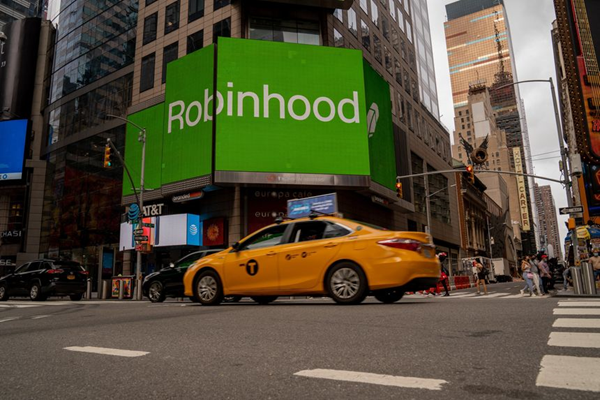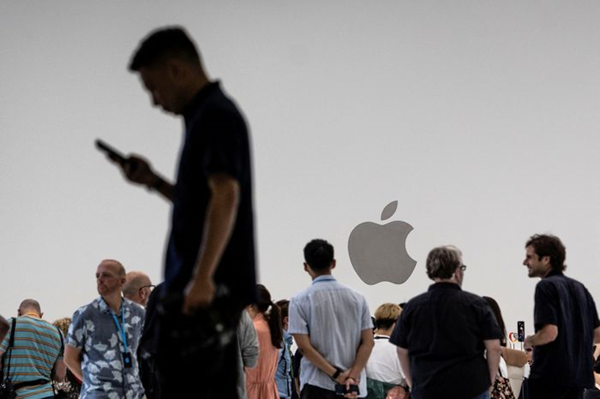
MARKETS
|
FINANCE
Robinhood Unveils Index to Track Customers’ Favored Stocks
Tesla, Apple, Amazon are most popular holdings, initial index
weightings show

Robinhood says it has more than 22 million funded accounts, and
the average age of its users is 32.
PHOTO: AMIR HAMJA FOR THE WALL STREET JOURNAL. |
By Alexander
Osipovich
Updated Sept. 9, 2022 3:43
pm ET
Robinhood Markets Inc. is offering a peek into the favorite stocks of
its millions of predominantly young, social-media-savvy customers.
The brokerage firm’s new “Robinhood
Investor Index,” unveiled Friday, is designed to track the
performance of the 100 investments most popular among its user base.
Such an index could be of interest to financial professionals who monitor the
activities of small investors as one of the underlying factors behind
stock-market moves.
Robinhood says it has more than 22 million funded accounts, and the average age
of its users is 32. The company’s popular
trading app played a key role in bringing an influx of new investors
into the market during the Covid-19 pandemic.
Critics—including a mix of regulators, financial watchdog groups and Wall Street
veterans—say Robinhood makes it too easy for newbies to
pile into risky bets. Last year many customers used its app to pile
into volatile meme stocks such as AMC
Entertainment Holdings Inc. and GameStop Corp.
Robinhood’s new index shows that its users favor a mix of meme stocks and more
conventional investments. Initially, the biggest five stocks in the index are Tesla Inc., Apple Inc., Amazon.com
Inc., Ford
Motor Co. and AMC.
Stocks in the index are weighted by what Robinhood calls “conviction,” defined
as the percentage of assets in a customer’s portfolio devoted to that stock.
Robinhood said AMC would have been ranked even higher—in the No. 3 spot—if the
movie chain hadn’t issued
preferred equity units last month, effectively creating two ways for
investors to hold AMC. The new units trade under the ticker “APE” and form the
ninth-biggest component of the index. GameStop is the 10th biggest. Robinhood
plans to update the composition of its new index monthly.
One of Robinhood’s aims in launching the index was to push back against public
perceptions that its customers are the dumb money in the stock market, Robinhood
Chief Brokerage Officer Steve Quirk said in an interview.
“There is an antiquated narrative that says retail buys at the top and sells at
the bottom,” Mr. Quirk said. “We just wanted to make sure that their behavior
speaks for itself, so people can look at the actual behaviors and determine how
they’re doing.”
Another reason why Robinhood launched the index was to provide its customers
with insight into what their fellow investors are doing, according to Mr. Quirk.
“They like to know that like-minded people are considering similar investments,”
he said.

Apple is one of
the largest stocks in the new Robinhood Investor Index.
PHOTO: CARLOS
BARRIA/REUTERS. |
Mr. Quirk said Robinhood had no plans to license its index to providers of
exchange-traded funds and there is no direct way to invest in the index or bet
against it.
That could alleviate concerns that sophisticated hedge funds or high-frequency
trading firms could use the index to place bets against Robinhood’s customers.
Still, the new index raises worries, said Tyler Gellasch, CEO of Healthy Markets
Association, a trade group representing institutional investors.
“Even if the index isn’t licensed to create a new fund, the insight Robinhood is
giving into its customers’ holdings and concentrations is extremely useful to
sophisticated investors,” Mr. Gellasch said. “Disclosing its customers’
‘convictions’ may be good for hedge funds and market makers, but it’s not clear
how this would be good for Robinhood’s other customers—the actual retail traders
on its platform.”
Robinhood said the data shared in the index was aggregated across all of its
customers, with no personally identifiable information from individual accounts.
An earlier experiment in which Robinhood shed light on its customer holdings
fueled concerns that the data could be used in ways that hurt customers.
During the early months of the pandemic, Robinhood released hourly data on the
popularity of stocks among its customers, which were aggregated by the
third-party website Robintrack.net. The site became a popular way to track
retail-investor activity until Robinhood shut off the data feed in August 2020,
citing concerns that its data could be “misconstrued or misunderstood."
Robintrack
creator Casey Primozic said the site’s server logs showed evidence of automated
visitor traffic from hedge-fund giants D.E. Shaw Group and Point72 Asset
Management, a sign of potential interest from number-crunching traders.
Representatives of D.E. Shaw and Point72 declined to comment.
A
Robinhood spokesman said the new index was fundamentally different from the
Robintrack data and would paint a more accurate picture of its customers’
preferences.
“We see evidence that the majority of our customers are primarily
buy-and-hold investors and, by examining the investments that our customers buy
and hold, we believe we’re helping to cut through the noise and show how our
customers are investing,” he said.
|
|
|
|
Amateur
investors took the stock market by storm a year ago, buying up shares of meme
stocks like GameStop and AMC Entertainment. Many remember it as a revolution
against Wall Street, but in the end, they largely just lined the pockets of
major financial firms. WSJ’s Dion Rabouin explains. Illustration: Sebastian Vega |
|
|
|
|
Robinhood was one of the most valuable startups in Silicon Valley before
its IPO. But now, its share price is down around 75%. WSJ’s Gunjan Banerji
explains how Robinhood fueled a meme-stock craze and why it’s now
struggling. Illustration: Preston Jessee |
Robinhood’s approach to weighting stocks in the index by conviction is unusual.
It means that if many Robinhood users devote a large part of their portfolio to
one stock, it would rank higher in the index, even if those users’ holdings were
relatively small. Robinhood tends to have less-affluent customers, with smaller
accounts, than other brokerages. The company says roughly half of its customers
are first-time investors.
The index offers “an interesting snapshot into their customer base,” said Alex
Matturri, former chief executive of index provider S&P Dow Jones Indices. A more
useful index would incorporate data from other brokerages that serve individual
investors, giving a broader picture of what such investors are buying, he added.
“Does it provide a valuable insight? We’ll see,” Mr. Matturri said.
Write to Alexander Osipovich at alexander.osipovich@wsj.com
Appeared in the September 10, 2022, print edition as 'Robinhood Adds Index
Tracking Its Users’ Picks'.

